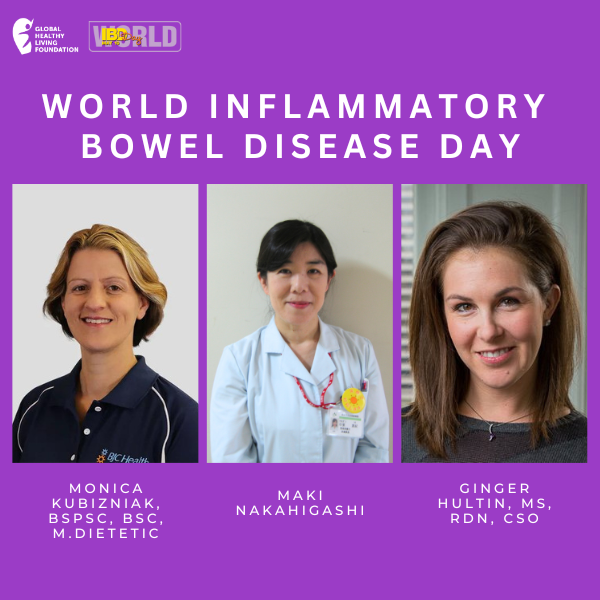In honor of World IBD Day, dietitians from three different continents share tips on managing diet and inflammatory bowel disease (IBD).
WHAT’S THE DIFFERENCE BETWEEN IBS AND IBD?
WHAT’S THE DIFFERENCE BETWEEN IBS AND IBD?
December 3, 2020
Anne M. Sydor

It can be easy to confuse irritable bowel syndrome (IBS) with inflammatory bowel disease (IBD). Both are common chronic diseases with symptoms of abdominal pain and chronic (long-lasting) diarrhea or chronic constipation that can start at any age. Another thing the two conditions have in common is that we don’t know yet what causes either disease. It is also possible for a person to have both IBS and IBD.
Both IBS and IBD can cause severe abdominal pain, social discomfort, difficulty with work and other public situations, and even work loss. As described below, IBD also has other symptoms that can cause additional problems.
It is important to know the differences between these two conditions because treatments for each are very different, ranging from adjusting diets for IBS to using immune therapy or surgery for IBD.
Inflammatory Bowel Disease Is a Condition of Structural Damage from Inflammation
IBD in itself can be confusing because it’s an umbrella term for two distinct diseases: ulcerative colitis, which affects only the lining of the large intestine or colon, and Crohn’s disease, which can affect any part of the gut—from the mouth to the anus. Both types of IBD, ulcerative colitis and Crohn’s disease cause physical damage to the gut that can been seen with an x-ray or endoscopy (using a camera to look inside the gut from the mouth or anus) or during surgery.
The damage caused by IBD can lead to severe symptoms, including fever, weight loss, lack of energy, joint pain (arthritis), skin rashes (dermatitis), and sore red eyes. These symptoms occur because IBD is an autoimmune disease, which means that the immune system is overactive and attacking the body. Right now, we don’t know which comes first, damage in the gut that causes immune overactivity or the reverse; it’s a bit like the question of which came first—the chicken or the egg. What is important to understand is that the immune system and gut damage occur in a cycle and that the overactivity of the immune system also causes symptoms outside of the gut. The immune system responds as if there were an infection, causing symptoms similar to infection, like fever, weight loss, lack of energy, joint pain (arthritis), skin rashes (dermatitis), and eye inflammation.
In IBD, there might also be bleeding in the intestines that can result in iron-deficiency anemia (low blood iron). Structural damage can also result in ulcers (open sores) from mouth to anus, fistulas (abnormal connection of tissue between two body parts), abscesses, scarring, bowel damage, liver damage, severe dehydration, or malnutrition.
Irritable Bowel Syndrome is a Condition Without Structural Damage or Inflammation
In IBS, no physical damage can be seen with imaging studies (x-rays or endoscopy). The symptoms of discomfort, pain, and diarrhea without damage are the only way to know a person has IBS, which can make it more difficult to understand. The absence of physical damage doesn’t mean that it doesn’t make it difficult to function, which is why IBS is sometimes called a functional disorder.
Because the immune system is not involved in IBS, the other, sometimes more serious, symptoms of IBD do not occur. That doesn’t mean that the symptoms are not a problem or that someone with IBS does not need medical care, although almost half of people with IBS do not seek care.
Diagnosis of Inflammatory Bowel Disease and Irritable Bowel Syndrome
Anyone with symptoms of IBD or IBS or any lasting change in their bowel habits should see their primary care provider, and possibly a gastroenterologist (a specialist in diseases of the gut) doctor to get help and make sure no other serious disease, such as colon cancer, is present.
To diagnose IBS or IBD, a doctor should ask many questions about the pain, discomfort, and problems with bowel movements. A doctor may need to order blood and stool testing, radiological imaging such as x-rays, CT or MRI, or an endoscopy exam to make sure no other disease is present, and to see if there is structural damage that occurs with IBD.
Treatments Are Different
Treating Inflammatory Bowel Disease
Treatments for IBD include anti-inflammatory drugs and immune system suppressants, many of which can have serious side effects and so should not be used to treat IBS.
People with IBD may also need anti-diarrhea medicines, pain relievers (but not those in the NSAID [nonsteroidal anti-inflammatory drugs] class like Advil or Aleve as they can make symptoms worse), and vitamin and iron supplements. In IBD it is also sometimes necessary to get nutrients by feeding tube or intravenously (putting nutrient fluid into a vein) so that the gut can rest and heal.
Some people with IBD will need surgical treatment, which is also not appropriate for IBS. Removing part of the intestines or bowel can cure ulcerative colitis and reduce the severity and spread of Crohn’s disease.
Treating Irritable Bowel Syndrome
For both IBS and IBD, changes in diet that eliminate foods that are more likely to cause gas or diarrhea can be helpful. For IBD, however, this will not be enough to prevent damage and other treatments will be needed.
When dietary changes are not enough to control symptoms of IBS, anti-diarrhea medications and laxatives can help with the symptoms of IBS. Sometimes, drugs to relieve gut spasms will be prescribed. Drugs that treat other types of neurologic pain and also depression may also be helpful. There are other treatments that relax the colon, stop muscle contractions of the bowel, or change fluid balance in the colon. Most of these have serious risks and side effects, however, so they are used only in severe cases of IBS that do not respond to other treatments.
Conclusion
Although IBS and IBD have some symptoms in common and can both affect peoples’ quality of life significantly, they are very different conditions with different treatments and different likelihoods of serious problems. As an autoimmune disease, IBD involves much more than the gut and can cause serious complications. Changes in diet can be helpful for both conditions, but this is rarely enough for IBD. Treatment of IBD usually requires drugs with serious side effects (anti-inflammatories and immune suppressants) and often surgery is needed. In contrast, it is common for IBS to be controlled with dietary changes alone.
SUBSCRIBE TO GHLF
RELATED POST AND PAGES
_
Was this article helpful?
YesNo




